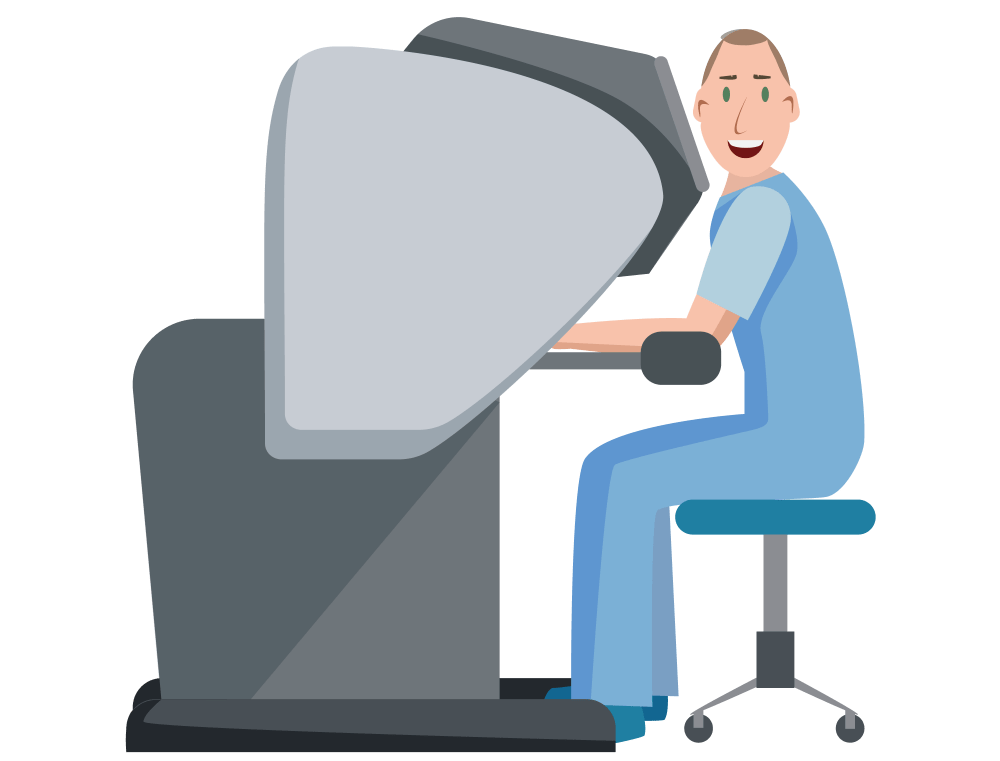Robotic surgery has revolutionized the way we approach many surgical procedures, including inguinal hernia repair. While the minimally invasive approach offers many benefits, including reduced pain and faster recovery times, it’s important to understand that there are limitations to what you can do following surgery. In this blog, we’ll explore some of the common limitations that patients may experience after robotic inguinal hernia repair.
Physical Activity
One of the most common limitations after robotic inguinal hernia repair is physical activity. While it’s important to get up and move around as soon as possible after surgery to promote healing, patients should avoid any strenuous activities for several weeks after the procedure. This includes heavy lifting, jumping, intense stretching or golf swinging, or any other activities that put stress on the abdominal muscles. Although there is no set number of pounds patients cannot lift, we encourage them to use their pain level as a limitation of what they can do or not. Patients should also avoid driving for a few days after surgery, or until they are no longer taking narcotic pain medications.
Urination
In rare instances, patients may have trouble urinating after a robotic inguinal hernia repair. This can be particularly an issue in patients known to have prostate enlargement. However, we found that most patients can urinate in the comfort of their home, and encourage them to take a shower, sit on the toilet or use any other measures they think may help in case they have difficulties. If unable to void for 6-7 hours since you last passed your urine (usually just before the start of the operation), present to the nearest emergency room and let them you had hernia surgery and cannot urinate. Insertion of a catheter to decompress the bladder may be necessary in this rare instance.
Diet
Another limitation after robotic inguinal hernia repair is diet. Patients should avoid any foods that are difficult to digest, such as spicy or fatty foods, for at least the first few days after surgery. It’s also important to stay hydrated and to eat plenty of high-fiber foods to promote healthy bowel movements.
It is not uncommon for patients to feel bloated after a robotic operation. This is a combination of the CO2 insufflated into the abdomen and the sluggishness of the intestine secondary to narcotics and general anesthesia. Walking and stool softeners are good ways to expedite bowel function recovery. The bloating will disappear once the bowel habits are back to normal.
Pain and Discomfort
While robotic inguinal hernia repair is less invasive than traditional open surgery, patients may still experience some pain and discomfort after the procedure. Pain medications can help manage these symptoms, but patients should be aware that some medications may cause drowsiness or other side effects. Patients should also avoid any activities that cause pain or discomfort, and should contact their doctor if they experience severe or worsening pain. We encourage our patients to apply ice to the groin area and wear underwear with scrotal support, which may help reduce the discomfort.
Sleeping
There is no limitation with regards to sleeping after robotic hernia repair. Patients can sleep on either side of the body, back or face-down, whichever way they feel most comfortable.
Sexual Activity
Patients may wonder when it is safe to resume sexual activity after robotic inguinal hernia repair. While there is no set timeframe for when patients can resume sexual activity, it’s generally recommended to wait at least two to three weeks after surgery, or until any discomfort or pain has subsided. Patients should also avoid any positions or activities that put pressure on the abdominal muscles or the hernia repair site. It’s important to discuss any concerns or questions about resuming sexual activity with your doctor, as they can provide personalized recommendations based on your individual situation. By following your doctor’s advice and listening to your body, you can ensure a safe and comfortable return to sexual activity after robotic inguinal hernia repair.
Follow-up Appointments
Finally, patients should be aware of the importance of follow-up appointments after robotic inguinal hernia repair. These appointments allow the doctor to monitor the patient’s progress and to ensure that the hernia is healing properly. Patients should attend all scheduled appointments and should contact their doctor if they have any concerns or questions.
In conclusion, while robotic inguinal hernia repair offers many benefits, it is important to understand that there are limitations to what you can do following surgery. Patients should avoid strenuous physical activity, follow a healthy diet, manage pain and discomfort, and attend all scheduled follow-up appointments. By following these guidelines, patients can promote healing and ensure the best possible outcome after surgery.


Still having problems; last surgeon used fishing line to stitch me up that ripped; second surgery he did sutures ripped open and he wouldn’t re stitch me. He additionally removed a “foreign substance” that pathologist couldn’t identify and I am believing that was sheep mesh? I just want a stitch job.
Robotic inguinal hernia repair enters the peritoneal cavity and allows the potential for intraperitoneal adhesion formation. It is NOT less invasive than an anterior approach, it is MORE invasive.